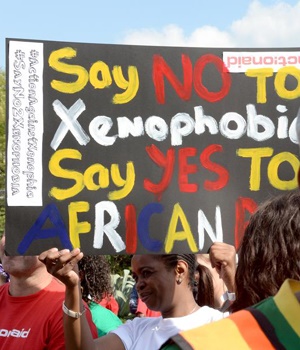
Burning vehicles and angry mobs chasing foreigners from their homes ... have we forgotten about the sacrifice made for our freedom by other African countries? Stephen Miller gives his impression
I am a South African who works for an international childcare organisation, helping children who have been separated from their families.
My regional head office is in Addis Ababa and I am regularly connected to colleagues from 26 African countries.
It is an interesting position to be in, because I am privy to a range of opinion on what matters to people on the continent today.
I particularly enjoy interacting with the other national directors at SOS Children’s Villages, who are wonderfully gregarious and share their thoughts openly in our joint chat group. We have a real camaraderie.
So I was dismayed last week when our chat group started sharing images of xenophobic violence in KwaZulu-Natal. Photos of burning vehicles and angry mobs chasing foreigners from their homes.
My friends on the continent were horrified.
One counterpart asked angrily: “Have South Africans forgotten about the sacrifice made for their freedom by other African countries?”
Read: Cultural collaboration could help SA heal its divided past
I am an avid consumer of news media in South Africa, but I simply was not aware of what was going on in Durban.
So I hurried online and, sure enough, there were some stories about another wave of xenophobic violence.
Politicians and other public figures were explaining how foreign people were “illegal” and running unlicensed businesses and implying that this somehow justified the violence.
This was a big deal story, but there was limited coverage of the violence in the South African media, even after Minister of International Affairs Lindiwe Sisulu called a meeting with all the African ambassadors.
Even after three people were reported killed.
But the story was all over social media, accompanied by a video of one of our presidential candidates calling for a clampdown on “illegal immigrants”.
I meekly responded to my colleagues that these views are not representative of South Africans, who are generally a very tolerant and open-minded people.
And I absolutely believe this. Because that same week we saw an amazing display of solidarity by South Africans in the wake of Cyclone Idai.
One of our SOS Children’s Villages in Mozambique had been devastated by the cyclone and we were overwhelmed by the generosity of South Africans and their sincere concern for the people affected by the disaster.
This is the South Africa of Nelson Mandela. And it provides a sharp contrast to much of the populist electioneering that we are seeing in the run-up to the May national elections.
South Africa is undeniably going through a difficult period, with a stagnant economy, soaring unemployment and persistent inequalities.
Violence against women and children is at unprecedented levels and too many young people are losing hope.
It is a complex situation, not amenable to simple solutions and we are understandably frustrated and anxious about the future.
And so we are looking for something or someone to blame. We need a villain to focus our anger on.
And there we have the “illegal immigrant”, who is supposedly taking our jobs, ruining our healthcare system and stealing our women.
If you are a public figure, it makes for powerful slogans when you’re speaking to a stadium full of frustrated people.
You get to sound tough and look as though you are taking control of a situation. Even if it’s nonsense.
This is not who we are, but it is who we will become if the public discourse continues in this way.
There is not much anti-immigrant messaging from politicians in the mainstream press in this election campaign, but instead we are hearing it in the stadiums, on the streets and on social media.
In my position, I interact with children and young people all over the country, from diverse backgrounds.
And I can guarantee you that they are listening very carefully to how we speak about foreign people.
My colleagues are also connected to children across Africa and they are watching us too.
This story and others like it will have repercussions far into the future, unless our current and prospective leaders speak out against xenophobia.
We need them to do this strongly and regularly, in the media and on the streets.
We need them to make us proud to be South Africans again.
Miller is national director at SOS Children’s Villages SA




 Publications
Publications
 Partners
Partners








